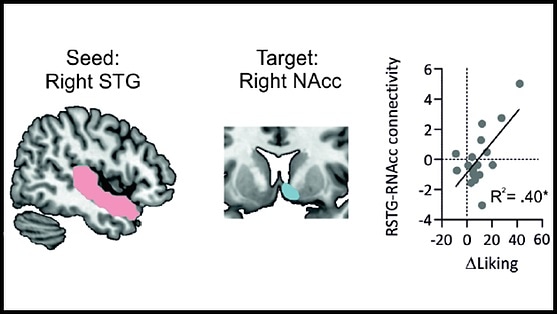Communication between the brain’s auditory and reward circuits is the reason why humans find music rewarding, according to new research published in JNeurosci.

Image Credit: Society of Neuroscience
Despite no obvious biological benefits, humans love music. Neuroimaging studies highlight similarities between how the brain’s reward circuits process music and other rewards like food, money, and alcohol. Yet neuroimaging studies are correlational by nature. In a new study, Mas-Herrero et al. sought to nail down the causal role of this circuitry by using non-invasive brain stimulation.
A group of pop music fans listened to a set of pop songs while the research team measured their brain activity with fMRI. Before the scan, the team indirectly excited or inhibited the brain’s reward circuit with transcranial magnetic stimulation. Exciting the reward circuit prior to hearing music increased the pleasure participants felt when listening to the songs, while inhibiting it decreased pleasure. These induced pleasure changes were linked to changes in activity in the nucleus accumbens, a key region of the reward circuit. The participants with the greatest difference in pleasure also showed the greatest difference in synchronized activity between auditory and reward regions. These results indicate interactions between auditory and reward regions drive the pleasure we feel when listening to music.
Source:
Journal reference:
Mas-Herrero, E., et al. (2021) Unraveling the Temporal Dynamics of Reward Signals in Music-Induced Pleasure with TMS. Journal of Neuroscience. doi.org/10.1523/JNEUROSCI.0727-20.2020.